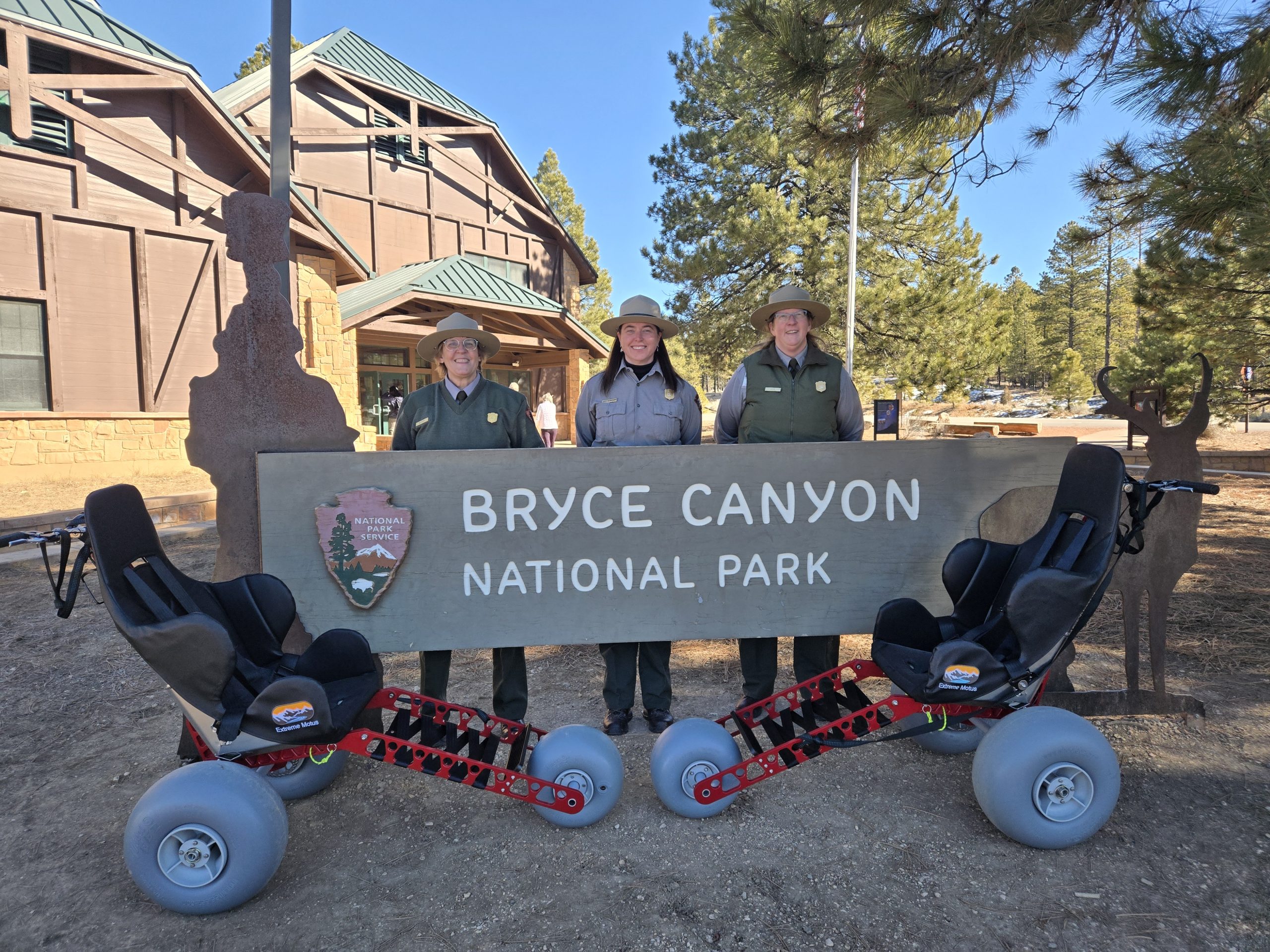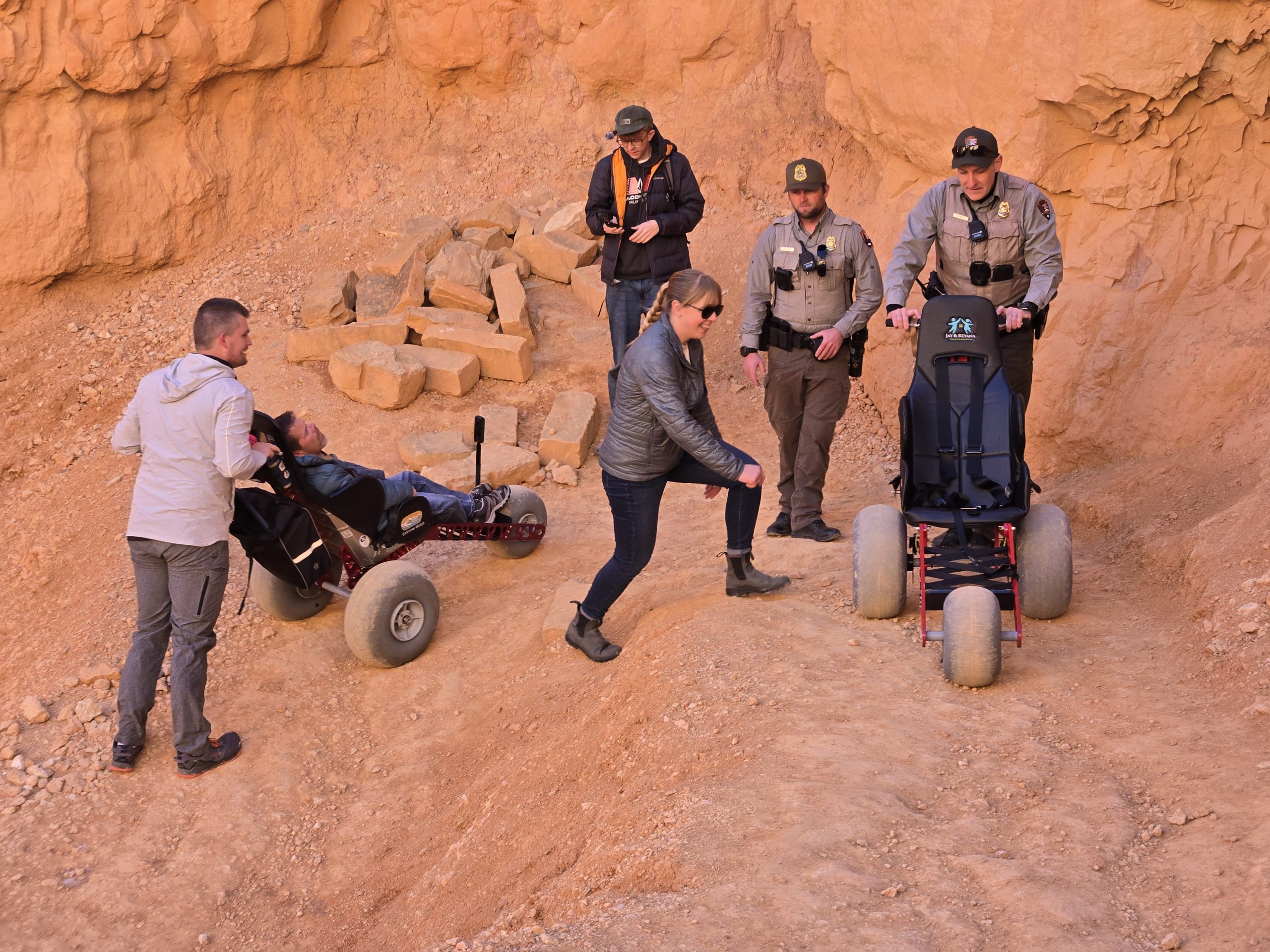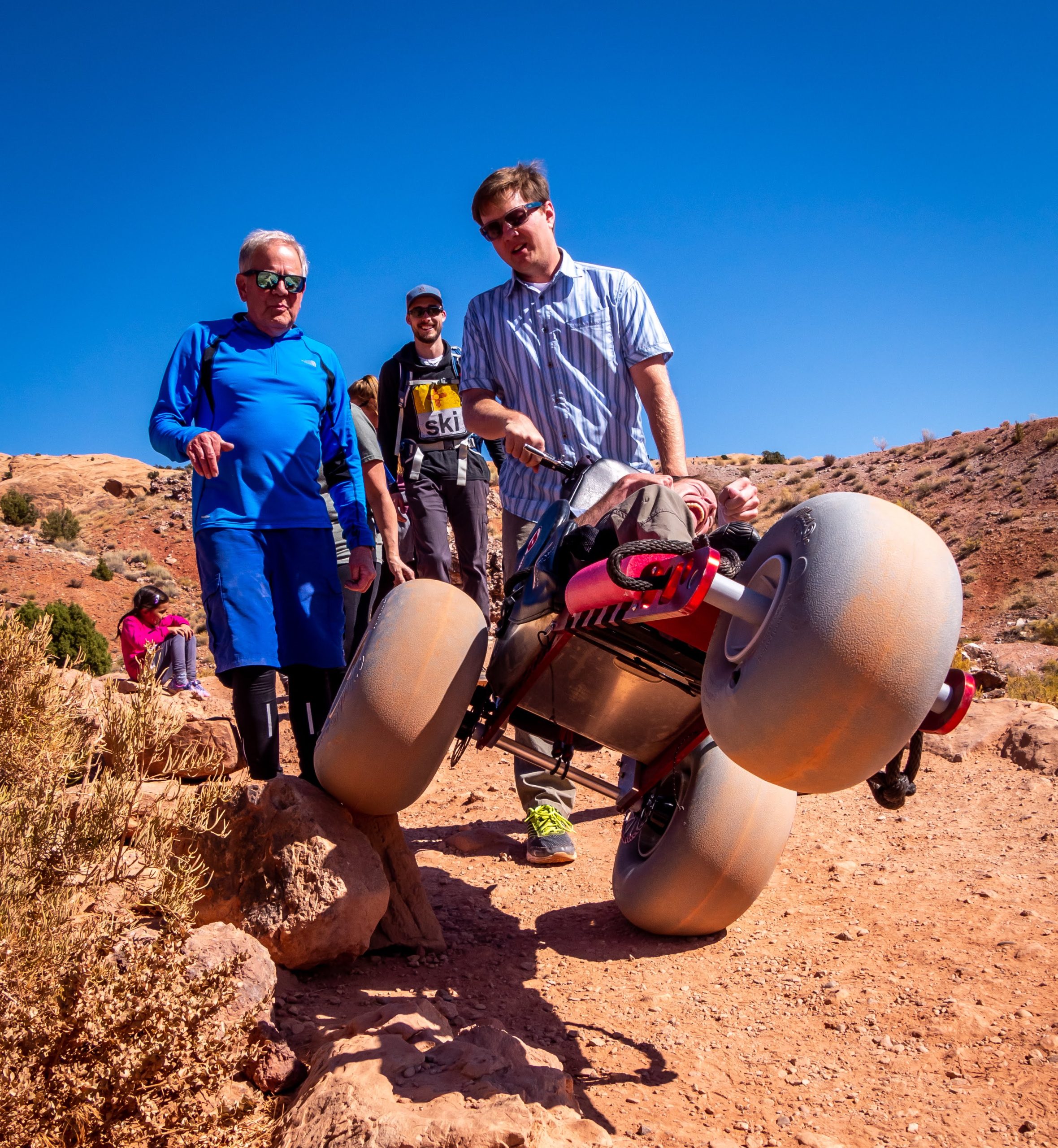The Adaptive Hiking Wheelchair by Extreme Motus
The Adaptive Hiking Wheelchair by Extreme Motus
Extreme Motus Adaptive Hiking Wheelchair is designed to provide people with mobility challenges with mobility and accessibility in various challenging terrains. If you are an outdoor enthusiast an adaptive hiking wheelchair will allow you and your friends and family to enjoy the outdoors together in a way that a standard wheelchair cannot provide.
Here are some key features:
Key Features:
- Versatility: The Extreme Motus wheelchair is built to handle diverse terrains such as sand, rocks, grass, gravel, and even water.
- Lightweight and Portable: Made from aluminum, the wheelchair is lightweight (around 49 pounds) and easily collapsible for transport.
- Low-Pressure Tires: Equipped with large, air-filled tires that act as suspension, providing a smooth ride over rough surfaces.
- Durability: Engineered with high-quality materials to withstand the rigors of outdoor adventures.
- Customizable Options: Available with features like a 5-point harness and aluminum racing seat for added support and safety.
- Accessibility: Designed to be pushed and pulled over any terrain, making it accessible for users with varying levels of mobility.
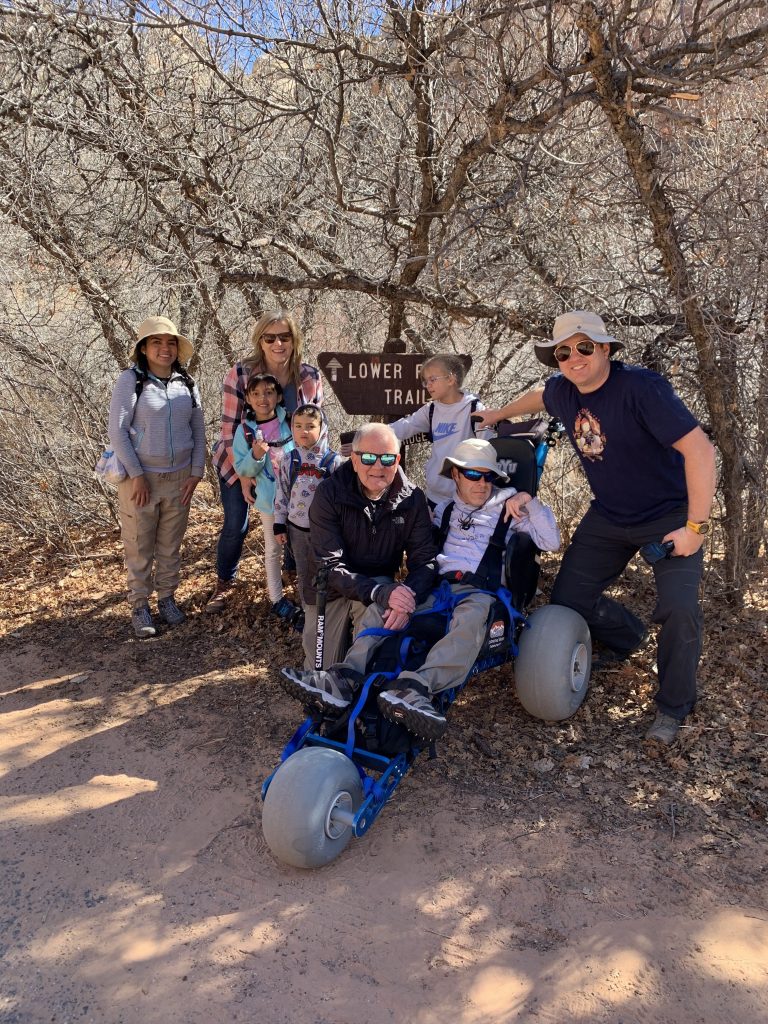
Benefits:
- Enhanced Mobility: Allows users to explore trails, beaches, and other outdoor areas that are typically inaccessible with standard wheelchairs.
- Independence: Provides the freedom to enjoy outdoor activities without relying on others for assistance.
- Family-Friendly: Enables families to participate in outdoor adventures together, creating shared experiences and memories.
What is the price of the Extreme Motus Adaptive Hiking Wheelchair?
As of this writing, the Extreme Motus sells for $4500 plus $375 in shipping. There are a few options and accessories you may want for your chair like a 5-point harness or some bags that make it easy to carry extra water or a ventilator on your adventures. You can view all of these options in our online store.
Is the Extreme Motus Adaptive Hiking Wheelchair Powered?
No. The Extreme Motus is a manual all-terrain wheelchair. There are pros and cons to this but it boils down to cost and weight. Manual all-terrain wheelchairs are much more affordable than their powered counterparts. They also weigh much less. This makes it easier to transport your all-terrain wheelchair to the trailhead without the need for additional equipment like a truck and trailer.
Where can I find Adaptive Hiking Wheelchair Locations?
Over the last few years, there has been a big push for accessibility in public places like State and National Parks. Sam and I even went to the Utah State Capitol to speak before the legislative committee about why devices like adaptive hiking wheelchairs are important to provide in these locations. We have found that many state and national parks don’t think they are important because “We don’t get many wheelchair users here.” Or, “We’ve never had a request for an all-terrain wheelchair before.”
One thing you can do to help the spread of these important mobility aids is pick up the phone and ask your local state and national parks if they provide accessibility equipment like adaptive hiking wheelchairs or all-terrain wheelchairs. Let them know you want to come and enjoy their park but cannot do so without the proper equipment available to borrow or rent on location. When enough people express interest in something the parks will begin to take notice and make the necessary changes required to serve people with mobility challenges.
Although there is a lot of work to be done there has also been a lot of progress.
Here are some resources to help you find adaptive hiking wheelchair locations:
- GRIT Freedom Chair’s Accessible Hikes in America Guide.
This guide provides a comprehensive list of wheelchair-friendly trails across all 50 U.S. states. You can download the guide and explore hundreds of accessible trails. - TrailLink
TrailLink offers detailed maps and descriptions of wheelchair-accessible trails, including reviews and photos. You can search for trails in specific states or regions. - Local Parks and Recreation Departments
Many local parks and recreation departments have information on accessible trails and outdoor activities. It’s a good idea to check with your local department for recommendations. - Accessible Travel Websites
Websites like DisabledTravelers.com and WheelchairTravel.org offer resources and guides for accessible travel, including hiking and outdoor activities.
Which National Parks Provide Adaptive Hiking Wheelchairs?
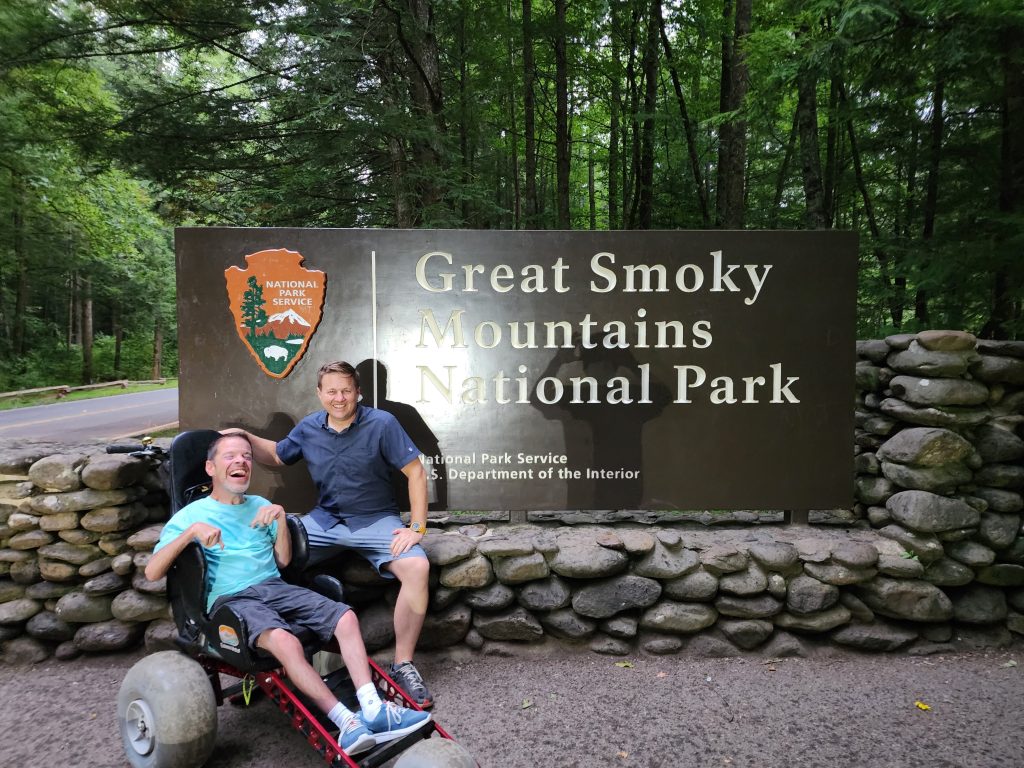
Several national parks in the U.S. offer all-terrain wheelchairs to help visitors with mobility challenges enjoy outdoor adventures. You should also call ahead when planning your trip to one of these parks to learn about the equipment they have, and the reservation process to make sure the adaptive hiking wheelchair is still in service and ready to be used when you arrive.
Here are some parks that provide these adaptive devices:
National Parks with All-Terrain Wheelchairs:
- Lake Clark National Park and Preserve, Alaska: Offers beach wheelchairs.
- Great Sand Dunes National Park, Colorado: Provides beach wheelchairs.
- Rocky Mountain National Park, Colorado: Has all-terrain manual chairs.
- Canaveral National Seashore, Florida: Offers beach wheelchairs.
- Gulf Islands National Seashore, Florida: Provides beach wheelchairs.
- Cumberland Island National Seashore, Georgia: Offers beach wheelchairs and track chairs.
- Kennesaw Mountain National Battlefield Park, Georgia: Provides track chairs.
- Indiana Dunes National Park, Indiana: Offers beach wheelchairs and other devices.
- Acadia National Park, Maine: Provides beach wheelchairs.
- Assateague Island National Seashore, Maryland: Offers beach wheelchairs.
- Sleeping Bear Dunes National Lakeshore, Michigan: Provides beach wheelchairs and track chairs.
- Cape Hatteras National Seashore, North Carolina: Offers beach wheelchairs.
- Cape Lookout National Seashore, North Carolina: Provides beach wheelchairs.
- Pu’uhonua o Hōnaunau National Historical Park, Hawaii: Offers beach wheelchairs.
These parks have programs to loan out mobility devices, including all-terrain wheelchairs, to enhance accessibility for visitors with disabilities. It’s a great way to explore beautiful natural landscapes without limitations.Which National Parks Provide Adaptive Hiking Wheelchairs?
Which State Parks Provide Adaptive Hiking Wheelchairs?
Several state parks across the U.S. offer all-terrain wheelchairs to help visitors with mobility challenges enjoy outdoor adventures. Here are some examples:
State Parks with All-Terrain Wheelchairs:
- Colorado: Staunton State Park offers track chairs for visitors.
- Georgia: Multiple state parks, including Cloudland Canyon and Fort Yargo, provide all-terrain wheelchairs through the Aimee Copeland Foundation.
- Michigan: Several state parks, such as Tahquamenon Falls and Sleeping Bear Dunes, offer all-terrain wheelchairs.
- Minnesota: Pilot programs in various parks, including Jay Cooke State Park, have tested all-terrain wheelchairs.
- South Dakota: Offers all-terrain wheelchairs in several state parks, with plans to expand the program.
- Tennessee: Multiple parks, including Fall Creek Falls and Cedars of Lebanon, provide all-terrain wheelchairs.
These parks have programs to loan out mobility devices, including all-terrain wheelchairs, to enhance accessibility for visitors with disabilities. It’s a great way to explore beautiful natural landscapes without limitations.
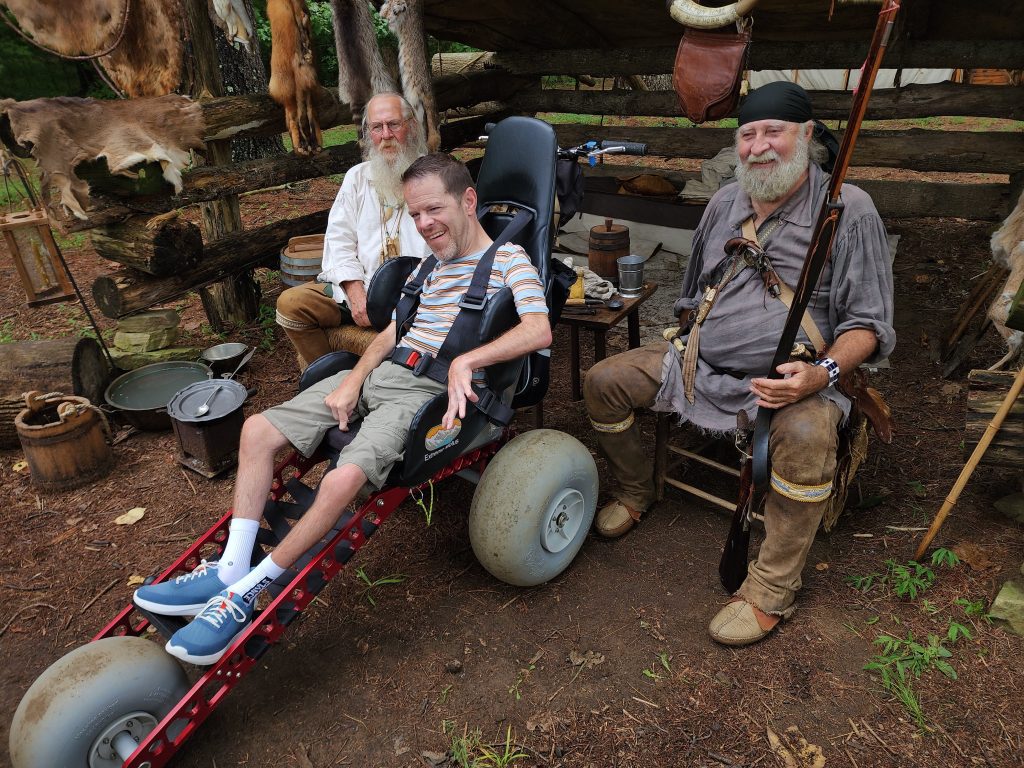
Conclusion
Adaptive hiking wheelchairs are revolutionizing the way individuals with mobility challenges experience the great outdoors. These innovative devices bridge the gap between accessibility and adventure, allowing users to traverse rugged terrains, explore picturesque landscapes, and engage in physical activities that were once out of reach. From the versatile Extreme Motus All-Terrain Wheelchair to the powered Action Trackchair, these wheelchairs are designed to provide stability, comfort, and independence.
The benefits of using adaptive hiking wheelchairs extend beyond just physical mobility. They foster a deeper connection with nature, promote mental well-being, and enhance social interactions by enabling shared outdoor experiences. As technology continues to advance, and more public spaces embrace the importance of accessibility the future holds even more promising developments in adaptive mobility, ensuring that everyone, regardless of their physical abilities, can embrace the joy and freedom of outdoor adventures.
Investing in an adaptive hiking wheelchair is not just about mobility; it’s about reclaiming the spirit of exploration and experiencing the world without limitations. So gear up, hit the trails, and allow your family the ability to make lasting memories in the great outdoors.
Every year, more families discover the freedom these chairs create—this Black Friday, demand is already building fast. By joining the early-access list, you secure your chance to order before the sale goes public on November 28, 2025.
Since 2019, Sam and Ryan have been demonstrating that nature is wheelchair accessible with the Extreme Motus All Terrain Wheelchair. From National Parks to Skateparks, their adventures prove that a manual off-road wheelchair can offer laughter and joy while navigating diverse terrains.
Join us as we continue to share these inspiring journeys.
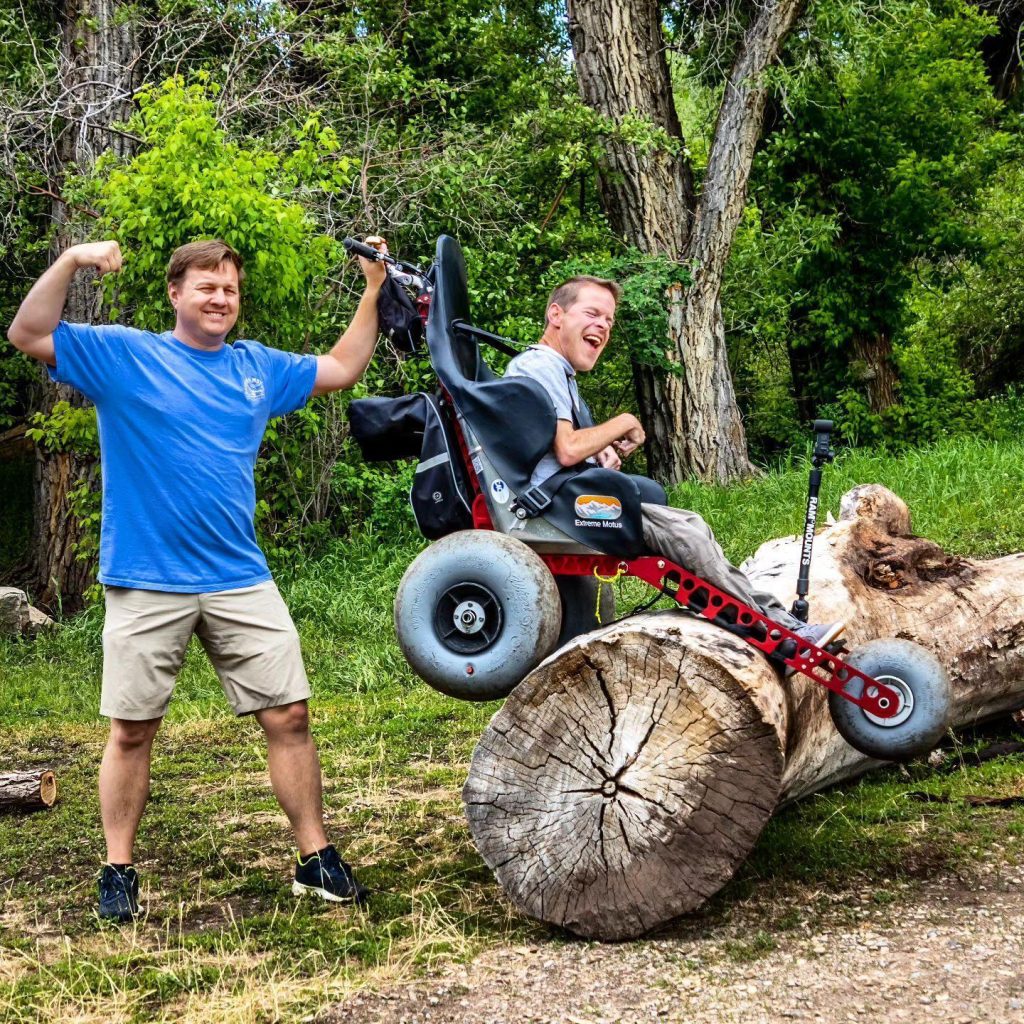
Light, comfortable, and compact, the Extreme Motus glides over sand, rocks, grass, gravel, and even floats in water.
It’s more than a outdoor wheelchair; it’s your ticket to freedom. Embrace the outdoors with confidence, knowing our off-road wheelchair is engineered for durability and ease of use.
Be the first to hear about new gear, upcoming adventures, and exclusive offers. As a welcome gift, enjoy $10 off your first Motus T-Shirt when you subscribe.
By subscribing you agree to receive marketing communications from Extreme Motus, including product updates, promotions, and special offers. I understand I can unsubscribe at any time.

